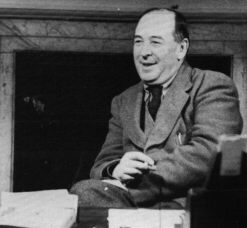C.S. Lewis and Evangelicalism
 I am currently re-reading C.S. Lewis' "Mere Christianity." After reading a biography by his adoptive son (see book review here), I became curious about who he really was as a Christian. You see, there is some debate about Lewis, in some evangelical circles, about whether or not he should be considered a true evangelical. The short answer, in my estimation, is no. But that isn't necessarily a bad thing in Lewis' case. It's sort of like saying, "Is C.S. Lewis a real Baptist." Perish the thought!! He probably wouldn't be caught dead in a typical Baptist church. Let me explain.
I am currently re-reading C.S. Lewis' "Mere Christianity." After reading a biography by his adoptive son (see book review here), I became curious about who he really was as a Christian. You see, there is some debate about Lewis, in some evangelical circles, about whether or not he should be considered a true evangelical. The short answer, in my estimation, is no. But that isn't necessarily a bad thing in Lewis' case. It's sort of like saying, "Is C.S. Lewis a real Baptist." Perish the thought!! He probably wouldn't be caught dead in a typical Baptist church. Let me explain.First of all, Lewis came from an atheistic background. He had no real interest in religion until later in life. Like most of the intellectuals at Oxford (and later, for him, Cambridge) Christianity had already had it's day. It couldn't solve life's ills in the past, so why should it (or how can it) in the future? That all changed for Lewis when he was "magically" converted. Yes, there was the intellectual ascension, but there was also the spiritual awakening as well. After being "born-again" Lewis felt compelled to express his faith in various forms of writing. He maintained his position at Oxford (as professor of Medieval and Renaissance Literature) and joined the Church of England. The world that he found himself in (after becoming a Christian) was totally different than anything that you and I can relate to. His unique position, as a professor at Oxford, ended up playing a crucial role in his apologetic ministry. I am reminded of the Apostle Paul's position as a Pharisee and as an expert in Jewish law. God used this (background) in Paul's life to write much of the New Testament. Who else but Paul could have summarized the teachings of Christ and reconciled them with the Hebraic Scriptures? Lewis was, likewise, used to reach his time and culture in a unique way. He is now looked upon as one of the most important Christian writers of the 20th century.
He had a "high" view of the New Testament and passionately argued against the liberal leanings of his contemporaries. He did not, however, share this view of the Old Testament (though he admitted that he could be wrong). The Old Testament, according to Lewis, was filled with "myths" and legends, but these myths culminated into the "true myth" of Christ. Christ was the true myth, while all other myths were just whispers of Him. Lewis firmly believed in Christ, both as the Son of God, and as God incarnate. He argued for the miracles of the New Testament, but somehow couldn't believe in those of the Hebrew Scriptures. Why he came to this conclusion, I do not know.
There were other issues with Lewis, but all in all, he believed in the essentials of the Christian faith (as defined in evangelicalism). It could be argued that if he were born in a different context (let's say, perhaps, Kentucky) he would have been your typical evangelical. Though I lament the fact that he had some erroneous beliefs, I do believe that he shared in the heart of evangelicalism. He trusted in Christ for his salvation, he was "awakened" spiritually, and he shared and practiced his faith. He doesn't fit the mold perfectly, but he is a kindred spirit. More on Lewis and "Mere Christianity" later.


0 Comments:
Post a Comment
<< Home